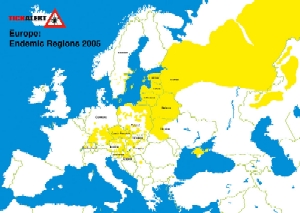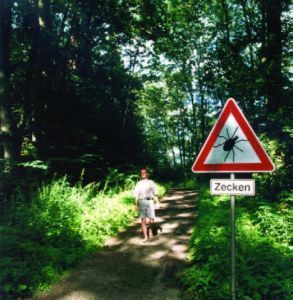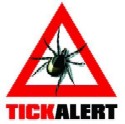Be careful driving in Uganda's capital, Kampala. The pot holes in Kampala's roads are said to be so bad that protesters have started to plant banana trees in the middle of the potholes. One campaigner says he saw a fish caught in one of the bigger potholes that had filled with water.
All posts by The Beetle
Outdoor Enthusiasts Urged To Protect Against TBE
Outdoor enthusiasts and holidaymakers planning trips to central and eastern Europe this year are being warned about a potentially life-threatening disease.

The 'Tick Alert' awareness campaign urges travellers to 16 named European countries, including many of the new popular destinations for outdoor tourism such as Croatia, Slovenia and Slovakia, to protect themselves against Tick Borne Encephalitis (TBE).
Increased tourism to rural and woodland areas of endemic countries in Europe is increasing the risk to visiting UK outdoor enthusiasts, the majority of whom remain unaware of the disease, how it is contracted or that they are members of a high-risk travel group.
TBE is a potentially life-threatening viral disease that can lead to meningitis and in serious cases can result in paralysis and death. It is transmitted via the bite of an infected tick, found typically in rural and forest areas up to a height of 3,000ft and occurs mainly during the late spring and summer months. The disease can also be transmitted by the ingestion of unpasteurised milk.
There has been a dramatic rise in the incidence of tick-borne diseases in central and eastern Europe over the last 10 years. TBE is now endemic in countries spreading from Sweden, across the Baltics and down to Croatia.
The fact that a number of endemic countries conduct intensive inoculation programmes for their resident populations should be heeded by all UK visitors.
“There is a low awareness of TBE, even among people experienced in outdoor activities abroad,” said Tick Alert's Lynda Bramham. “The aim of this campaign is to encourage anyone travelling to TBE endemic regions, and at risk of the disease through their outdoor leisure activity, to take effective precautions.”
Official figures show the number of UK tourists to the former Yugoslavia rose by 40 per cent last summer to 114,000 compared with the previous 12 months. Similarly, visitors to central and eastern Europe reached 558,000, an increase of 38 per cent.
 Adventure travel, hiking and mountain biking in Europe are all
increasing in popularity as people discover these new destinations.
Adventure travel, hiking and mountain biking in Europe are all
increasing in popularity as people discover these new destinations.
A 2004 report by Mintel highlighted the growth of agritourism and countryside holidays in places such as Croatia and Estonia, and the Association of British Travel Agents (ABTA) lists Slovenia and Bulgaria among its hot tips for holidays in 2005.
Professor Sarah Randolph, head of the Oxford Tick Research Group at the University of Oxford said: “In some countries of mainland Europe the most serious vector-borne disease is caused by a virus transmitted by ticks, tick-borne encephalitis (TBE), which may kill one in every hundred people infected.”
There are a number of bite prevention measures that can be taken to reduce the risk of infection: these include using an insect repellent, wearing protective clothing to cover all areas of exposed skin, regularly inspecting your body for tick bites and carefully removing any that are found. However, the Foreign Office advises that travellers to TBE endemic regions seek inoculation advice form their local surgery of clinic – well before travelling.
 Immunisation against TBE is available as a paid-for travel vaccine
from specialist travel health clinics operated by MASTA, the
UK's leading provider, and at GP surgeries and healthcare
centres. For further information and advice for travellers visit www.masta.org/tickalert
Immunisation against TBE is available as a paid-for travel vaccine
from specialist travel health clinics operated by MASTA, the
UK's leading provider, and at GP surgeries and healthcare
centres. For further information and advice for travellers visit www.masta.org/tickalert
Mac's Travel Reminiscences
 We are sorry to
say that Mac is not very well, but he is still e-mailing strong and
recently sent the Beetle a collection of travel reminiscences and
in particular discusses some travel writers. Former Globetrotter
President, Arthur Frommer (Europe On $5 A Day) gave an interesting
interview to travel writer Michael Shapiro for Michael's book,
A Sense of Place Great Travel Writers Talk About their Craft, Lives
and Inspiration.
We are sorry to
say that Mac is not very well, but he is still e-mailing strong and
recently sent the Beetle a collection of travel reminiscences and
in particular discusses some travel writers. Former Globetrotter
President, Arthur Frommer (Europe On $5 A Day) gave an interesting
interview to travel writer Michael Shapiro for Michael's book,
A Sense of Place Great Travel Writers Talk About their Craft, Lives
and Inspiration.
In this he writes: “As a G.I. stationed in Germany in the mid 1950s, Frommer had travelled on a shoestring whenever he had a couple of days off. Early on, he realized an essential truth pertaining to intrepid travellers. The less you spend, the more you enjoy. After travelling widely throughout Europe and self-publishing a slender guide for G.I.s, Frommer wrote his seminal Europe on $5 a day”.
Arthur Frommer was my hero and his books were my bible for years. One of his funny stories: “Our first edition of Mexico on 5 Dollars A Day was written by John Wilcock who hates Mexican food. He spends pages telling you where you can find a decent tuna fish salad sandwich in Mexico City. I think I wrote to tell them that place he recommended was now a parking lot! He doesn't like Mexican food, yet he is the author of one of classic guidebooks to Mexico. When you read the restaurant chapter you could tell that he is virtually holding his nose. I never changed that – what he wrote went into print. In my opinion, a copy editor's function is grammar, punctuation, consistent abbreviations and the like- it's not style. A copy editor has no right to impose his or his style upon the author.”
Close to home here he tells of “A young woman named Beth Bryant called us many years ago she lived in Washington, D.C. and said she wanted to write guidebooks. I said write the restaurant section of a hypothetical guidebook to Washington, D.C. in which you rate the government cafeterias. And she wrote this absolutely delightful comparison of the Justice Department cafeteria with the Commerce Department all of which are open to public visits. We immediately knew that we had a star on our hands. She was sent to Ireland where she wrote the first edition of our Ireland guidebook which is a travel classic. It's one of the best ones we have ever done.”
I am reading and enjoying A Fortune Teller Told Me by Tiziano Terzani. Here are some sentences I have copied down. Page 58: it was the Burmese kings hankering after one of the King of Siams' seven white elephants, very rare and therefore magical that sparked a war which lasted three hundred years – the upshot being that Auydhya (Siam's then capital) was destroyed and the Siamese had to build a new capital, present day Bangkok.
Page 54. The tie. Originally a Mogul invention for dragging prisoners tied to the pommels of their saddles. Note from the Beetle: some people believe that tie originates from Croatia. IN the 17th century, a huge number of soldiers and knights went to Paris to give their support to King Louis XIII and Cardinal Richelieu. Some Croatian mercenaries went too, wearing traditional costumes whose traditional included colourful scarves tied around their necks. This attracted the attention of the fashion-conscious French who adopted it as part of the uniform for French officers. The description “a la croate” evolved into “la cravate”. British exiled King Charles II took the fashion with him from France and soon the tie or cravat spread across Europe to America.
On Bangkok, page 33. Spirit temples and small shrines. The phii (spirit) of the plot of land where the old Erawan Hotel (in Bangkok) was built was so happy with the way it has been treated that it took to performing miracles and today its temple is still one of the most frequented and most popular in Bangkok. One of its specialties is to aid the conception of male offspring and thousands of sterile women have come to it with all sorts of offerings; some dance around it semi-nude at night. (Mac: I wish they would be more specific. At what time??)
Laos, page 27. During the war, every time the Pathet Lao crossed a river the last man had to turn back and call to a non existent comrade. The spirit of the river habitually carries off the last of the line i.e. the last man in the patrol, and in that way the guerrillas hoped to deceive it.
Tibet, page 2l. The Chinese to facilitate tourist access have decided to modernise the lighting of the Potala (used to be Dalai Lama palace-temple) and have installed neon lights. This is no accident as neon kills everything even the Gods. And as they die, the Tibetan identity gradually dies with them. This Italian writer travelled for a year in 1993 without using a plane as a fortune teller had told him not to travel by plane in 1993. He is the Far Eastern correspondent of the German newsmagazine Der Spiegel. Since 1994 he has made New Delhi his base.
Interesting times! Happy trails, Mac. Mac can be contacted on: macsan400@yahoo.com
Globetrotters Travel Award
A member of Globetrotters Club? Interested in a £1,000 travel award?
Know someone who is? We have £1,000 to award each year for five years for the best submitted independent travel plan. Interested?
Then see our legacy page on our Website, where you can apply with your plans for a totally independent travel trip and we'll take a look at it. Get those plans in!!
Deepest Cave Explored
A Ukrainian team of nine caving experts has set a new depth record for caving. They managed to go 2,080m (6,822ft) underground at Krubera in Georgia, the world's deepest known cave. The team carried an amazing five tonnes of equipment and kept in touch with the surface base camp by rigging nearly 3km (two miles) of rope strung with a telephone wire. The world's deepest known caves are:
- Krubera, Georgia (Abkhazia) 2,080m (6,822ft)
- Lamprechtsofen, Austria 1,631m (5,354 ft)
- Gouffre Mirolda, France 1,626m (5,335 ft)
- Reseau Jean Bernard, France 1,602m (5,256 ft)
- Torca del Cerro, Spain 1,589m (5,213 ft)
- Sarma, Georgia (Abkhazia) 1,542m (5,062 ft)
- Cehi 2, Slovenia, 1,533m (5,030 ft)
Our Friends Ryanair
Ryanair has banned its staff from charging their mobile (cell) phones at work, saying it is an inappropriate use of office time. A UK newspaper reported that staff were “furious” about the rule. However, a Ryanair spokeswoman said no-one had “batted an eyelid” since the rule was introduced about two months ago. She said the decision to ban the charging of phones was more related to work ethic than cost-cutting – though “obviously there is a small saving”. “It's not good for people to be charging up their phones in work time,” the spokeswoman said.
Have you got a tale to tell?
If you have a travellers tale that your aching to tell. Then why not visit the “Travel Sized Bites” section of the Website and share it with the world. Travel Sized Bites
Travel Writing Workshop
When: Saturday 18th June, 10.30am-4.00pm
Where: The Newsroom, The Guardian 60 Farringdon Road, London EC1R
3GA
Cost: £85.00
A day of two intensive workshops:
Travel Writing – How to do it and how not to with Dea Birkett, the Guardian's Travelling with Kids columnist and author of Serpent in Paradise and Off the Beaten Track
Fact, Fiction and Creating a Traveller's Tale with Rory Maclean, author of Falling for Icarus and Stalin's Nose
The workshops are followed by practical writing sessions. Participants should bring pen and paper – they will be expected to write! The emphasis is – whether you are a beginner or already have some writing experience – on developing skills which can be applied to both articles and books. Our aim is that, by the end of the day, each of you will have the tools to produce a publishable piece of travel writing.
For further details and application form contact: travelworkshops@deabirkett.com
For further information:
- www.deabirkett.com
- www.rorymaclean.com
- www.guardian.co.uk/newsroom
Satellite Photo
Spotted by Webmaster Paul, here's a satellite photo from Google of Buckingham Palace.
Iberia Contemplating Low Cost Arm
Spanish airline Iberia is considering buying or setting up its own low cost airline. More than 50 million foreign tourists visit Spain every year, increasingly arriving on budget airlines such as Ryanair, easyJet or Lufthansa's Germanwings. Watch this space!
